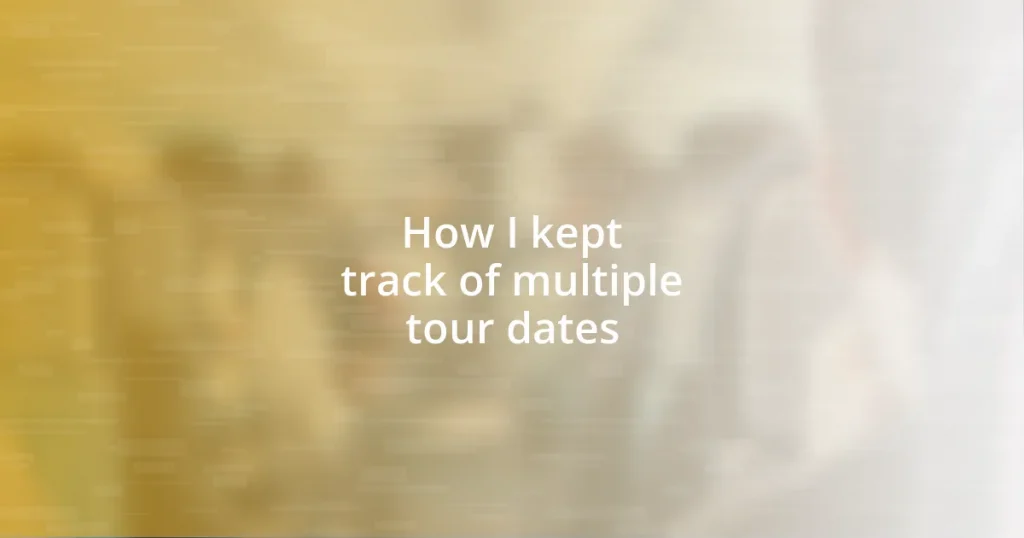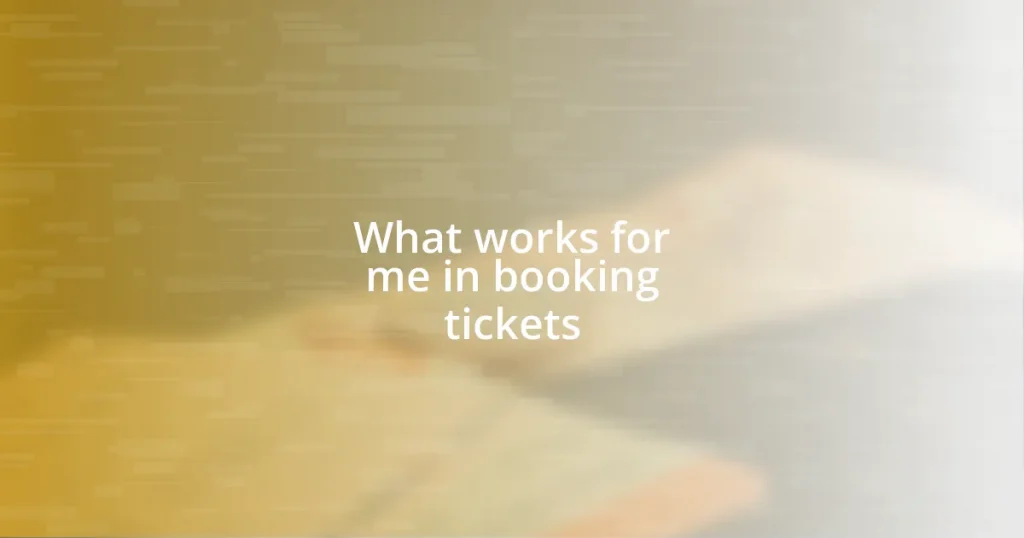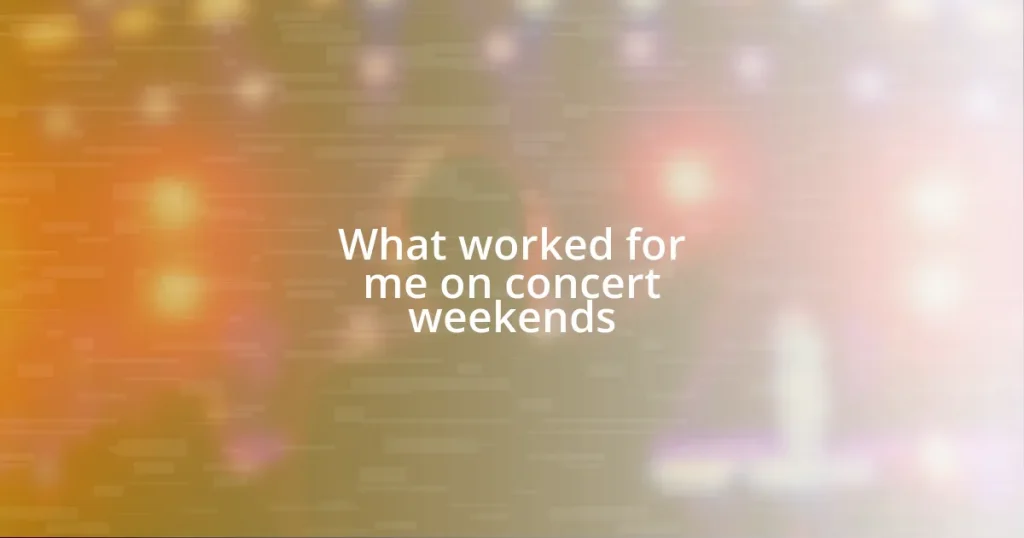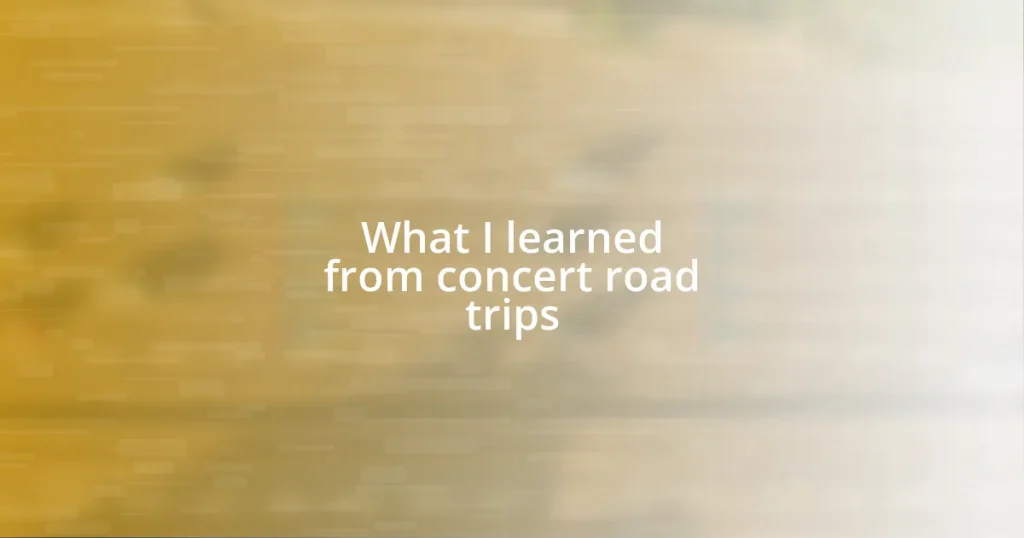Key takeaways:
- Tracking tour dates is crucial for organization, trend analysis, and anticipating challenges, enhancing overall experience.
- Using a centralized calendar with color-coding and device synchronization helps prevent double-booking and increases accessibility.
- Setting timely reminders and using multiple formats for notifications can provide an effective safety net against missed dates.
- Regular communication with team members and schedule reviews fosters stronger teamwork and adaptability during tours.
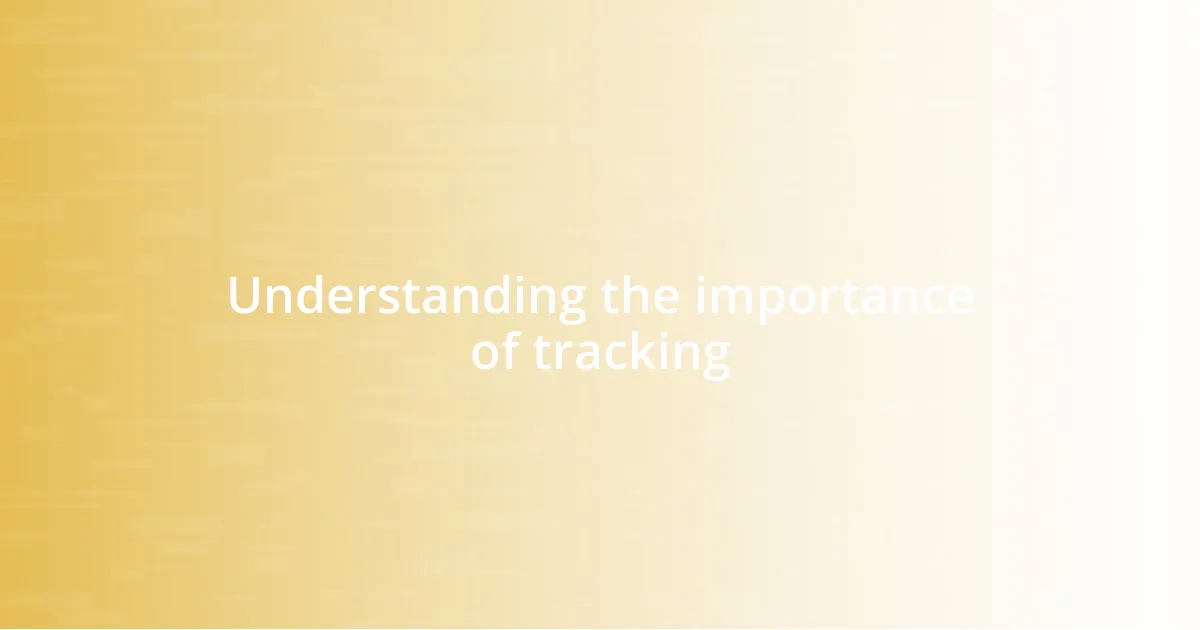
Understanding the importance of tracking
Tracking multiple tour dates is not just a matter of organization; it’s about safeguarding your passion and ensuring you don’t miss anything crucial. I remember one time when I mistakenly overlooked a date, and the feeling of disappointment was overwhelming. Isn’t it frustrating when excitement turns into regret simply because of a missed date?
Each tour date contributes to the bigger picture of your journey, whether it’s connecting with fans or fostering collaborations. I often reflect on how, by keeping meticulous notes, I’ve been able to visualize my growth and adapt my strategies. Have you ever thought about how tracking can reveal trends or highlight what works best for you?
Moreover, tracking helps you anticipate challenges. I learned this firsthand when a sudden venue change disrupted my plans; because I had everything documented, I was able to pivot quickly. How would you handle such surprises if you weren’t prepared? Understanding the importance of tracking transforms chaos into clarity, ultimately enhancing your overall experience.
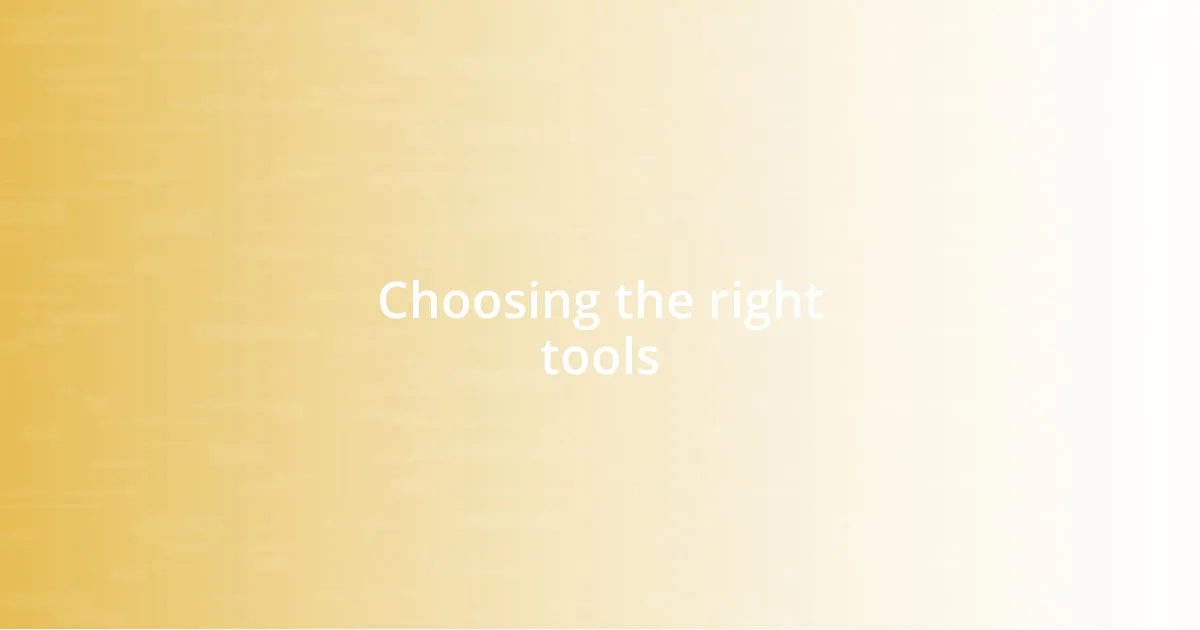
Choosing the right tools
When it comes to choosing the right tools for tracking tour dates, I’ve found that the options can be overwhelming. After experimenting with a few, I discovered that simplicity and usability go a long way. A straightforward calendar app was a game changer for me; it integrates seamlessly with my schedule and provides reminders that keep me on track. I remember a time when I relied solely on my memory, only to be met with a last-minute panic about an upcoming performance.
Here’s a quick rundown of tools that have proven effective for me:
- Calendar Apps: Google Calendar and Apple Calendar help visualize your schedule and send notifications.
- Spreadsheets: Excel or Google Sheets allow for customized tracking, including additional notes on venues or contacts.
- Tour Management Software: Programs like Bandsintown and Songkick can track dates and promote shows simultaneously.
- Task Management Tools: Apps like Trello or Asana keep you organized with to-do lists and deadlines.
- Note-taking Apps: Evernote and Notion are great for jotting down ideas or important changes during the tour.
Each tool serves a particular purpose, and finding the right combination made me feel more in control. I often ask myself: How can I make my life easier while still being organized?
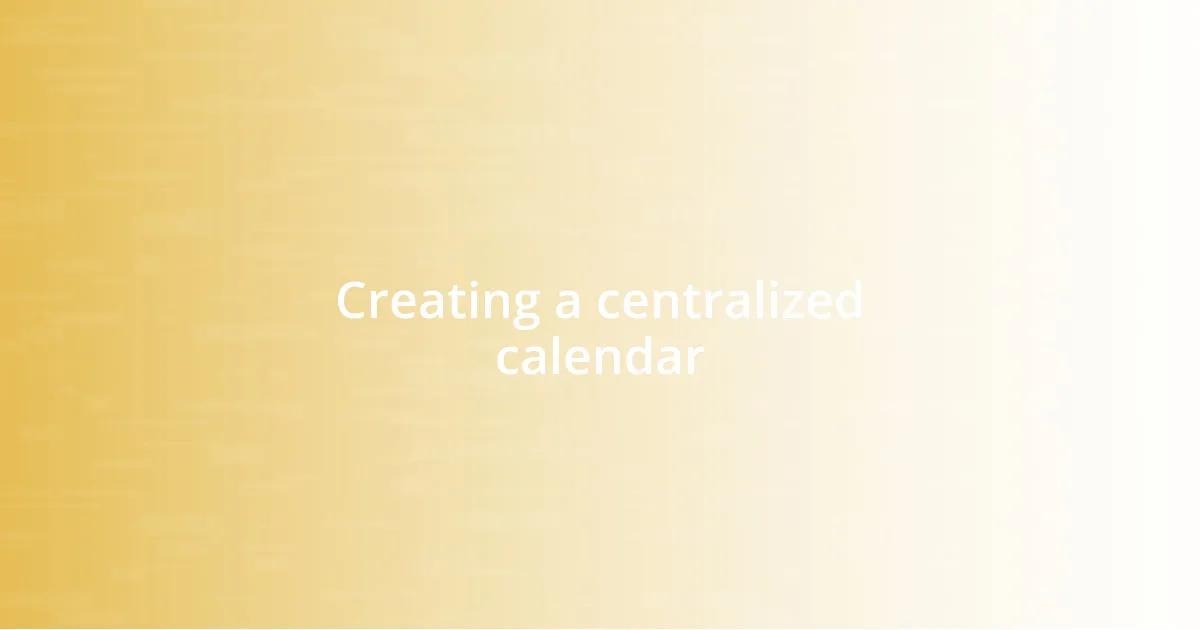
Creating a centralized calendar
Creating a centralized calendar is essential for staying organized during tour dates. I’ve learned that having one accessible place to gather all my performances offers a sense of control and clarity. When I first started, I relied on a mishmash of notes and scattered reminders, which led to confusion and frustration. Trust me, consolidating everything into one calendar made a world of difference.
What I’ve found particularly helpful is color-coding events based on their type—whether they’re rehearsals, gigs, or travel days. I recall a time when I mistakenly booked two events on the same date because I neglected to differentiate between them. Simplifying my calendar with colors not only prevents double-booking but also creates a visual guide to my month. Have you tried this approach? You might be surprised at how effective it can be.
Moreover, syncing my calendar across devices means I’m never out of the loop. Whether I’m on my laptop or checking my phone between sets, I have instant access to my schedule. I remember feeling anxious while on stage, wondering if I’d missed an important detail. After going centralized, that worry melted away; I now have everything I need at my fingertips, which is a huge relief.
| Feature | Your Calendar System |
|---|---|
| Centralized | All Tour Dates in One Place |
| Color-Coding | Visual Clarity |
| Sync Across Devices | Always Accessible |
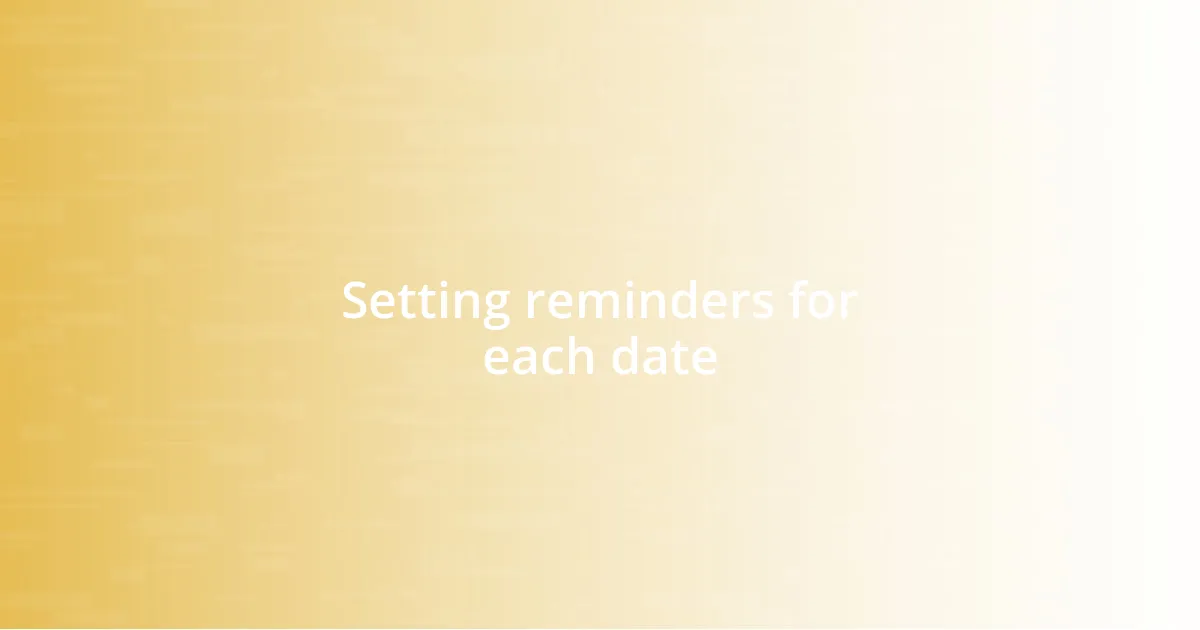
Setting reminders for each date
Setting reminders for each tour date has been a lifesaver for me. I remember when I missed an important gig last year because I relied too heavily on my own memory. Now, I set reminders not only for the date but also for things like travel arrangements and rehearsals, effectively creating a safety net for myself.
One method that really transformed the way I manage my schedule is using timed notifications. I typically set reminders a week in advance and then again a day before. This two-tier approach keeps everything fresh in my mind. I can’t tell you how many times I’ve appreciated that extra nudge. It feels like a gentle push from a friend reminding me to stay focused.
Another tip that works wonders is incorporating multiple formats of reminders—both digital and physical. While my phone pings with notifications, I also use sticky notes on my desk or a whiteboard to visually tally down upcoming dates. It’s funny how something as simple as a handwritten note can spark motivation. Have you ever found yourself feeling more organized simply by seeing your plans laid out in front of you? I sure have!
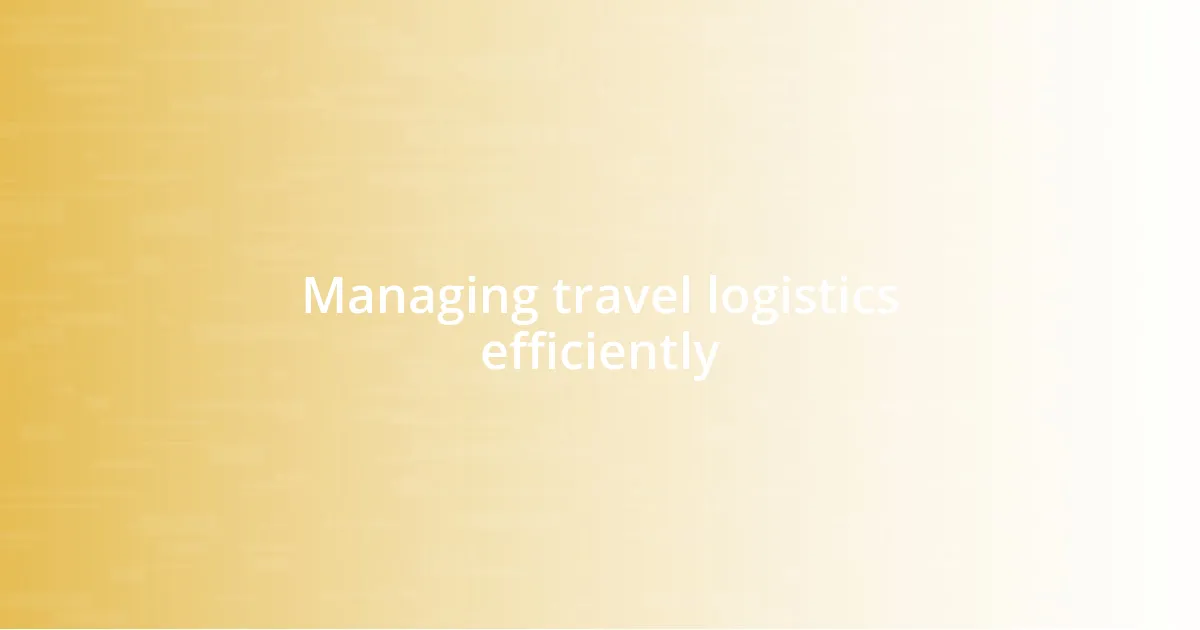
Managing travel logistics efficiently
Travel logistics can feel overwhelming at times, but I’ve discovered a few strategies that have made the process smoother. One significant shift in my approach was using a travel app to manage bookings. I remember a particularly hectic week in which I had to fly between three cities for gigs. Having all my flight details, hotel reservations, and transport schedules in one app helped reduce my stress levels immensely. I often wonder, how much easier could your travel planning become with the right digital tools at your fingertips?
Another key aspect is prioritizing transportation options well in advance. Once, I waited too long to book a train for an important show and ended up having to settle for a less convenient, more expensive option. Now, I make it a point to schedule my transport as soon as I know my tour dates. This allows me not only to choose the best times but also to save money. It’s a small change that has a big impact—who doesn’t want to keep more money in their pocket?
Lastly, I can’t stress enough how crucial it is to build in buffer time for unexpected delays. One time, I found myself stuck in traffic before a crucial show, and the panic was palpable. Now, I always add extra hours to my travel itinerary, allowing for those unforeseen hiccups. By doing this, I’ve learned to breathe a little easier, knowing I won’t wind up rushing to my next gig. Have you ever faced a transportation crisis on your way to an important event? I know I have, and it’s no fun!
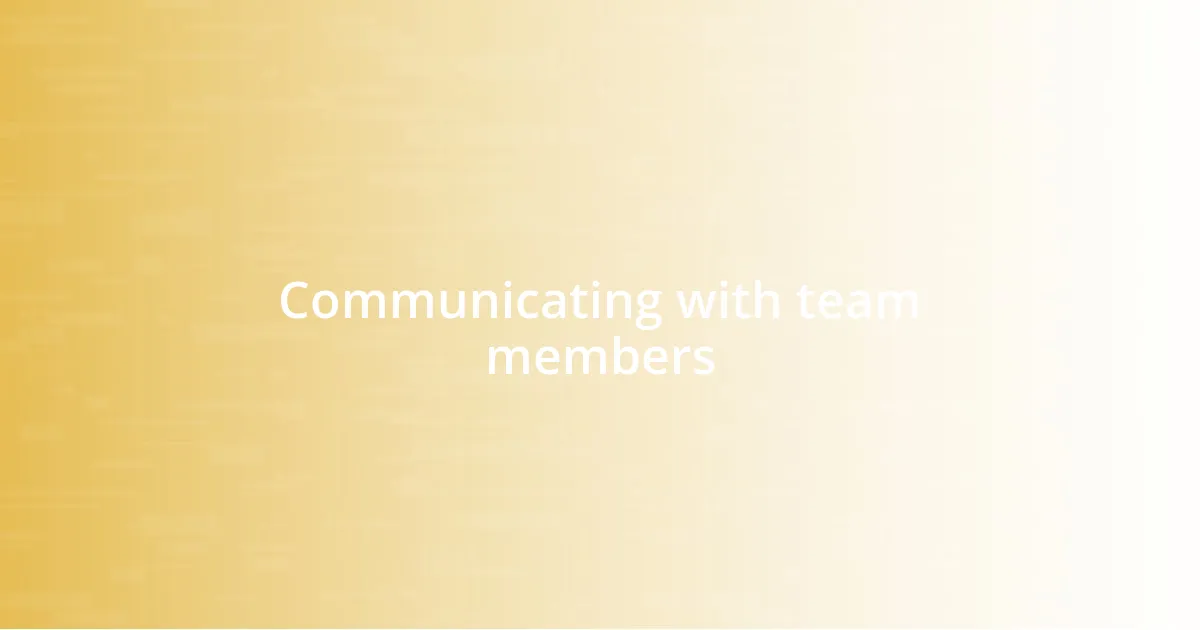
Communicating with team members
Communication is the backbone of any successful tour, and I’ve learned that early and consistent updates keep everyone on the same page. I’ll never forget a time when a last-minute schedule change led to a misunderstanding that almost caused a missed soundcheck. Since then, I prioritize sending out a weekly recap email to all team members, summarizing any changes or upcoming tasks. Wouldn’t it be frustrating if your team members were left in the dark about important updates?
In my experience, group chats have been instrumental for real-time communication. When we’re on the road, things can change in a heartbeat—like deciding to add an impromptu rehearsal or altering our travel route. These chats create a space where everyone can voice their thoughts quickly. I remember one night when the weather threatened our outdoor show; within minutes, my team and I coordinated a backup plan through our group chat. It’s really reassuring to feel that sense of teamwork when things get hectic.
I also find that regular check-ins, whether through video calls or in-person meetings, foster a stronger bond among team members. Reflecting on a particularly challenging tour, I realized that sitting down with my crew to discuss not just logistics but also to share personal experiences made a huge difference. It emphasizes that we’re not just a team; we’re a family. Have you ever noticed how a simple conversation can change the atmosphere on a tour? It’s a small effort, but it pays off immensely in morale and productivity.
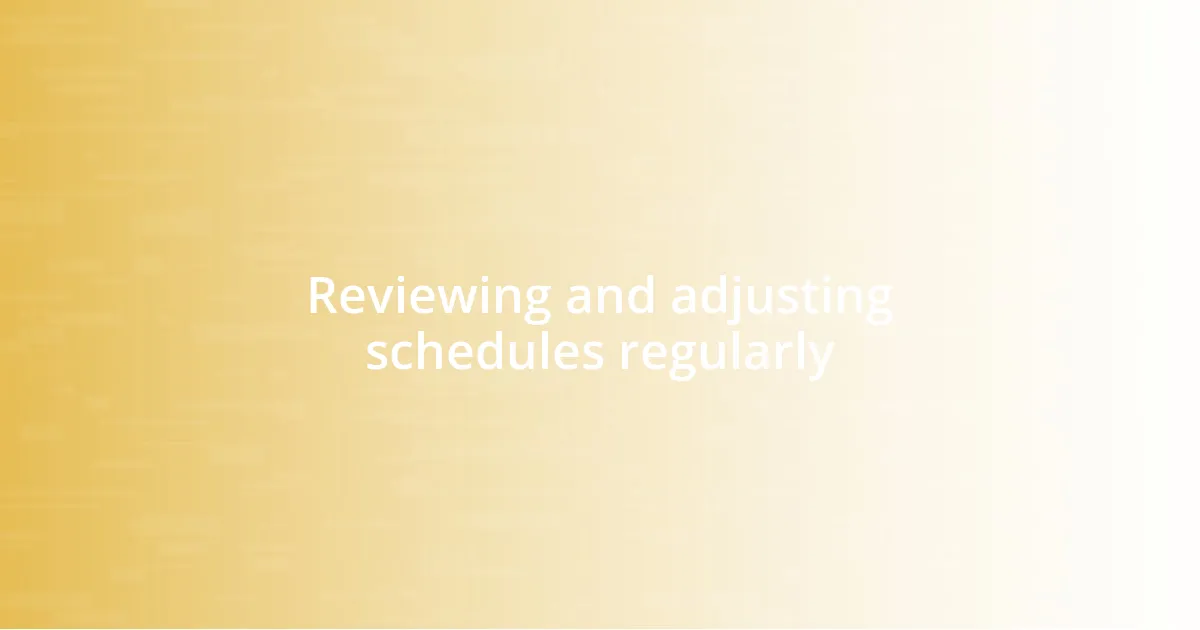
Reviewing and adjusting schedules regularly
It’s easy to overlook the need for regular schedule reviews when you’re caught up in the daily hustle of touring. I learned this the hard way during a tour when I missed a crucial change in one city’s performance timing. A simple weekly check-in on my calendar could have saved me from that chaotic scramble. How often do you set aside a moment to reassess your calendar?
I’ve also realized that flexibility is key. There was a time when I was too rigid about my pre-planned schedule. When an unexpected opportunity arose for a surprise performance, I hesitated, fearing it would clash with my commitments. Now, I actively look for ways to adjust my schedules, even if it means rearranging a few things. Have you ever felt torn between sticking to a plan and seizing an opportunity? I’ve since learned that sometimes letting go can lead to the most rewarding experiences.
I find it immensely valuable to write down any changes or adjustments I make during these reviews. It’s more than just keeping track; it’s about having a tangible reference for future planning. There was a particular instance when I incorporated notes from a past tour into my current itinerary, which allowed me to avoid previous pitfalls. It’s rewarding to see how reviewing and adjusting can lead to a more seamless tour experience. What strategies do you think would help in keeping your schedule manageable?










